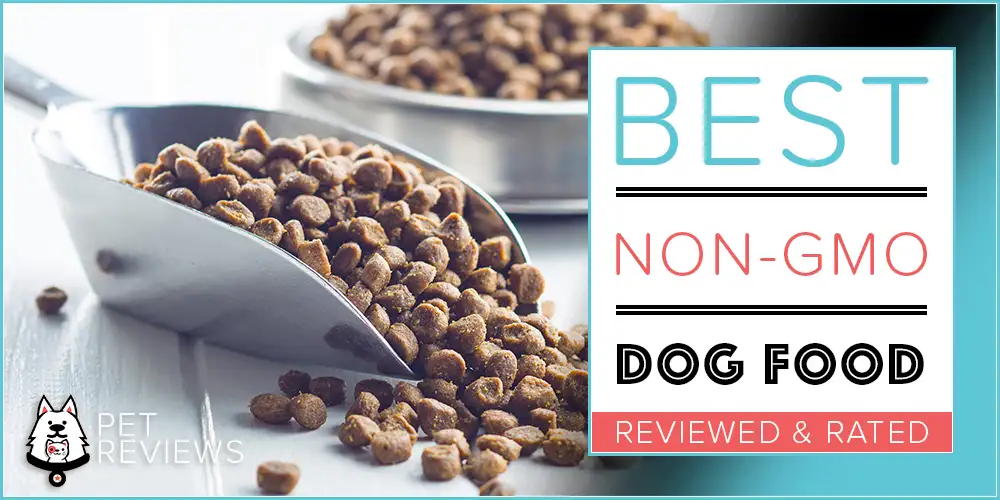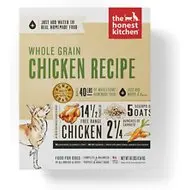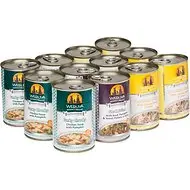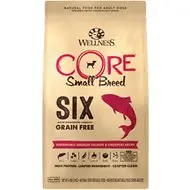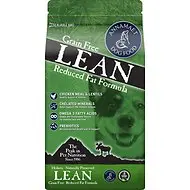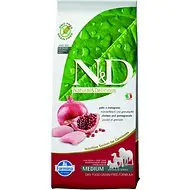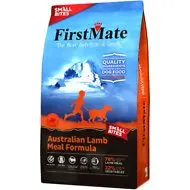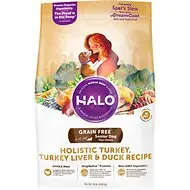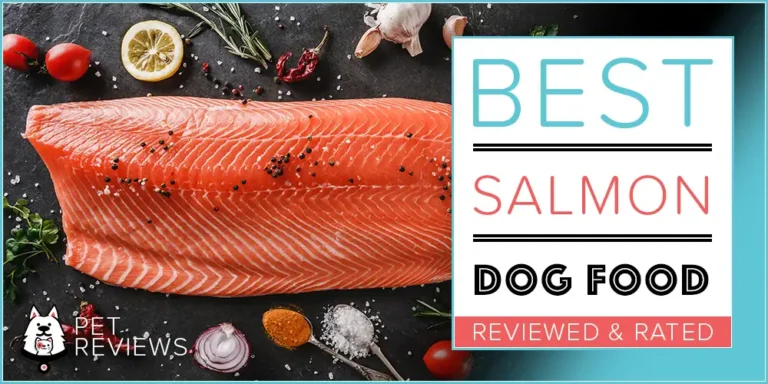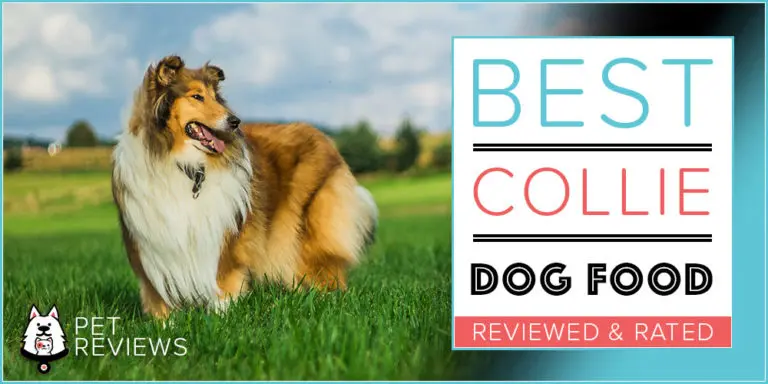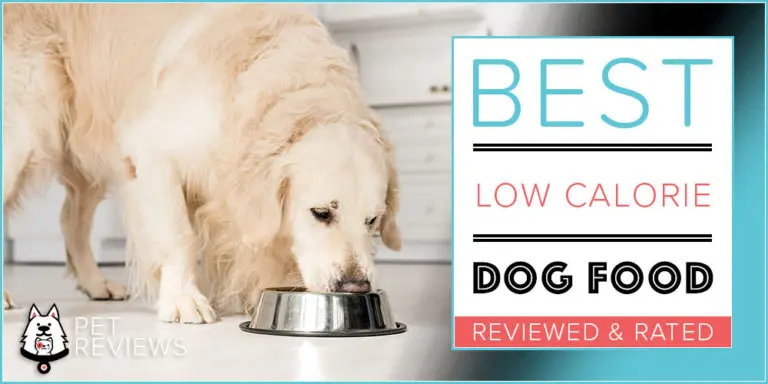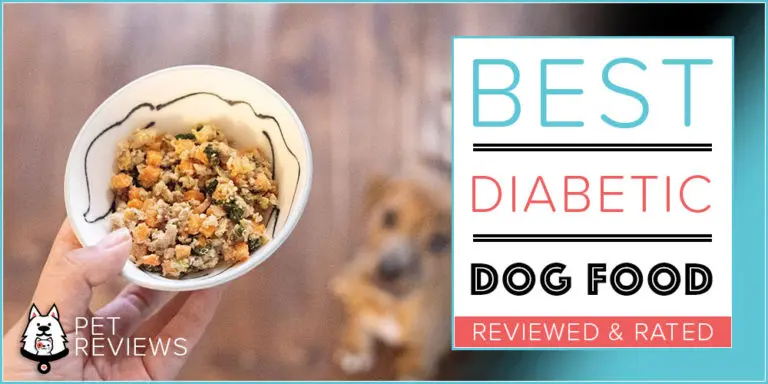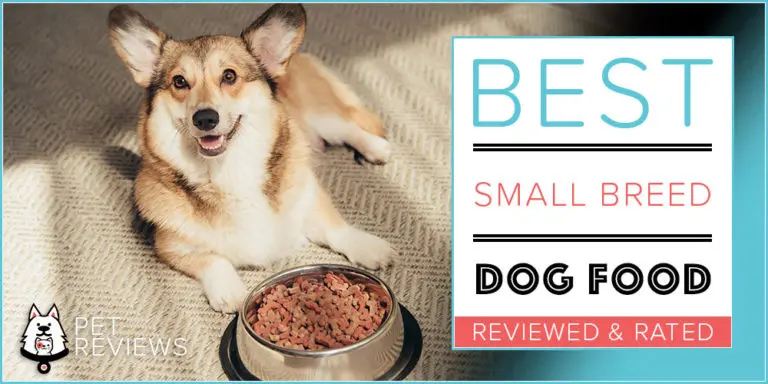7 Best Non GMO Dog Foods: Our GMO Free Dog Food Guide
Quick Guide
- What is Best Non GMO Dog Food?
- What are GMOs?
- List of Common Genetically Modified Crops
- GMO Health Risk and Issues
- Overall Best Dog Foods without GMO’s
- 5 More Top Rated Dog Foods that are GMO-Free:
- Wellness CORE SIX Salmon & Chickpeas Recipe Small Breed Dry Dog Food
- Annamaet Grain-Free Lean Low Fat Formula Dry Dog Food
- Farmina Natural & Delicious Chicken Grain-Free Formula Dry Dog Food
- FirstMate Small Bites Australian Lamb Meal Formula Limited Ingredient Diet Grain-Free Dry Dog Food
- Halo Holistic Turkey, Turkey Liver & Duck Recipe Grain-Free Senior Dry Dog Food
- Conclusion
GMO ingredients are often difficult to detect, unless the manufacturer explicitly lists their product as a GMO-free dog food. Even when feeding pets home-made meals, you could be subjecting their bodies to ill effects, including stomach issues or viral problems.
If you are looking to provide your pet with the highest quality diet to ensure his health and the longest life possible, it is vital to inform yourself about the ingredients included in many dog food products. GMO ingredients have existed in both human and pet foods for several decades, but their effects have only recently come to light.
As a pet parent, your responsibilities include reviewing ingredients thoroughly and not settling for the marketing catchphrases that sell you a “wholesome” or “natural” product. Many dog food brands market their product based on specific ingredients and fail to represent the genetically engineered ingredients infused into their recipes.
If you are wondering if you are supplying your adored fur buddy with the most optimal diet, keep reading to keep yourself apprised of the many dietary dangers being sold to you for your pup’s consumption.
What is Best Non GMO Dog Food?
- The Honest Kitchen Whole Grain Chicken Recipe
- Weruva No Ruff Days Variety Pack Grain-Free
- Wellness CORE SIX Salmon & Chickpeas Recipe
- Annamaet Grain-Free Lean Low Fat Formula
- Farmina Natural & Delicious Chicken Grain-Free
- FirstMate Small Bites Australian Lamb Meal Formulag Food
- Halo Holistic Turkey, Turkey Liver & Duck Recipe
What are GMOs?
GMO stands for genetically modified organisms; these are also commonly referred to as genetically engineered organisms. Dr. Rick Meilan, a molecular tree physiologist at Purdue University, explains that genes are comprised of DNA and they put together a list of directives for how cells are supposed to behave.
The word “modified” refers to a shift in the biological structure of a living organism. The last word is “organism,” acknowledging there has been a forced change to the molecular structure of living things, like crops.
To put it simply, genetically modified means DNA is being extracted from one organism and being forcefully injected into a different organism, creating an artificial crop. There are several crops included in dog food, such as soy, corn, potatoes, tomatoes, and peas.
GMOs seem inescapable when looked at through a simple lens but the truth is, they can be avoided. There is plenty of controversy surrounding the studies deeming GMOs safe, particularly because those studies are conducted by entities that profit from the use of GMOs, creating a conflict of interest.
With a keen eye on labels, you can find a non-GMO dog food that will keep your animal companion from suffering the health problems generally associated with the consumption of these unnatural ingredients.
List of Common Genetically Modified Crops
- Corn – Corn is a very common crop that is used to create several different ingredients used in processed dog food. The genetic modification includes chemicals that prohibit herbicides from damaging corn while out in the field, and only targeting weeds. Since the chemical protects the corn, excessive amounts of the herbicides can be used. Following testing of lab rats, there was a higher occurrence of kidney and liver problems following consumption of the modified corn (Sherbo, 2023).
- Potatoes – Potatoes have been genetically modified to avoid dark marks on the skin, giving them a more appealing appearance. They have also been engineered to expel a built-in pesticide whenever an insect attempts to feast on it, repelling further attempts to attack the crop (Scott, 2023). Studies conducted have shown that lab rats develop immune system issues, have disruptions to their stomach lining, and receive damage to vital organs following the consumption of modified potatoes (Scott, 2023).
- Alfalfa – Alfalfa is another crop that was genetically modified to make it resistant to herbicides, resulting in similar effects as corn. The disproportionate amounts of herbicide used on this crop make it an unsafe choice for your dog’s consumption, based on lab testing completed with rats.
- Tomatoes – The genetic modification of tomatoes has long been an issue, with the first variation never making it out for public consumption. Calgene, the creator-in-chief of a series of genetically engineered tomatoes, conducted a 28-day feeding study on several lab rats. The results were unfortunate for several of the rats who consumed the modified crop and experienced ruptures in their stomach lining followed by internal bleeding (Smith, 2010).
- Soy – Soybeans are a very common American crop that is distributed in part for human consumption and in part as an additive for dog food, usually as soybean meal. While this additive can be considered high in protein, its genetic modification affects its absorption. Many of our beloved furballs are allergic to this ingredient and you may have already witnessed those reactions which include tummy upset, diarrhea, vomiting, or other signs of discomfort.
- Beets – Beet pulp is an ingredient often used in dog food. This is generally considered a red-flag component because it is highly processed; however, you will notice many proponents of this food additive who claim the ingredient is a good source of fiber that aids with muscle growth. If genetically engineered, it is just another untrustworthy additive with strong coloring that will not aide your dog’s diet and more than likely will hinder his health.
- Peas – Peas are yet another crop tainted by genetic modification. While peas can provide important nutritional components for a dog’s health, if they are genetically engineered, their health benefits may be outweighed by their risks. Pea flour, for instance, is an ingredient that dogs may have a difficult time digesting, due to its structure.
GMO Health Risk and Issues
GMOs, by nature of their artificially altered structures, produce health risks for pets that include bleeding stomachs from injured stomach linings to affected immune systems that are unable to fight off foreign viruses (Scott, 2023).
There was a study conducted by Cornucopia Institute Research that determined genetically modified soy products that were fed to female lab rats resulted in the death of their babies within a three-week period.
Male rats were also part of the study and upon being fed with genetically modified soy, their outward reproductive organs turned dark blue from a natural pink color. There were multiple DNA changes noted within the study, whether they were fed modified soy or corn (Scott, 2023).
If you are considering a dog food product that contains dairy, you may want to review studies on the effects of genetically modified milk products which, according to Dana Scott from Dogs Naturally Magazine, has the potential of leading to thyroid cysts and internal organ damage, according to lab rat testing.
Many of our furry best friends suffer from allergic reactions to food additives, particularly breeds with a history of digestive difficulties. When your dog’s health is revered, as a pet parent, these facts are important to consider for ensuring their happy, long lives alongside our families.
Overall Best Dog Foods without GMO’s
The Honest Kitchen Whole Grain Chicken Recipe Dehydrated Dog Food
Key Features:
- Dehydrated, whole-grain dog food
- Made in the U.S.A.
- Non-GMO dog food
- Easy preparation
Overall Best GMO-Free Dog Food – This Honest Kitchen GMO-free dog food is made of intentional ingredients, including free-range chicken, unaltered garden vegetables, and whole-grain barley. This recipe was created with growing puppies and active dogs in mind because it contains a higher content of both protein and fat, compared to other recipes by this brand.
This food can be given to any size breed, ranging from small to large dogs. The Honest Kitchen boasts that all ingredients included in this formula are 100% human-grade, resulting in a safe, tasty product you can feel good feeding to your pup. Since the food is dehydrated, the naturally occurring vitamins and minerals are better preserved, offering higher nutrition content.
Pros:
- 100% human-grade dog food
- GMO-free product
- Zero corn, wheat, or soy
Cons:
- More expensive than other brands
- Not a good recipe for weight control
Weruva No Ruff Days Variety Pack Grain-Free Canned Dog Food, 14-oz, case of 12
Key Features:
- Natural canned dog food
- Made with high-quality proteins and minimal carbohydrates
- High moisture content
- All ingredients are grain-free and gluten-free
Best Canned GMO-Free Dog Food – This Weruva non-GMO dog food comes in three different flavors, including chicken (6 cans total), steak (3 cans total), and chunky chicken soup (3 cans total). It is formulated to be appropriate for all breed sizes and is free of grains and gluten.
The recipes include whole foods like free-range chicken, grass-fed beef, sweet potato, pumpkin, and other vegetables packed with nutrition.
This formula has also been infused with extra vitamins and minerals to provide a balanced meal that delivers stable energy. This wet food is versatile and up to you to feed as a main meal or as a yummy treat served on top of your dog’s usual dry dog food. First-class ingredients like white breast chicken and hand-picked cuts of beef set this selection apart.
Pros:
- Flavorful, wet food dogs love
- Contains a variety of flavors
- Appropriate for dogs of all sizes
Cons:
- More expensive compared to dry dog food
- Only available in an assorted pack of 12
5 More Top Rated Dog Foods that are GMO-Free:
Wellness CORE SIX Salmon & Chickpeas Recipe Small Breed Dry Dog Food
Key Features:
- Made with sustainably sourced salmon
- Limited ingredients for sensitive tummies
- All ingredients are grain-free and gluten-free
- GMO-free dry dog food
This Wellness CORE non-GMO, limited ingredient formula is made with salmon and salmon meal as its primary ingredients, delivering essential fatty acids to keep your dog’s skin healthy and his fur looking spectacular and glossy.
The recipe omits all grains, is free of chicken, chickpeas, potatoes, and dairy. With only six main ingredients, you can breathe easy knowing you recognize the foods combined to make this recipe nutritious and yummy for your fuzzy best friend.
Pros:
- Non-GMO dog food
- Grain-free formula
- High protein
Cons:
- Only available in 4 lb. and 12 lb. bags
Annamaet Grain-Free Lean Low Fat Formula Dry Dog Food
Key Features:
- Reduced-fat recipe for weight control
- Non-GMO dog food
- Zero corn, wheat, or soy
- All ingredients are grain-free
This Annamaet dry dog food is formulated especially for dogs who may be overweight, for large breed puppies, and for dogs who have developed pancreatitis. Pancreatitis a difficult condition for pups, causing pain in the abdominal area, some vomiting, and a general loss of appetite. The recipe includes chelated minerals that are meant to strengthen and support your doggie’s immune system.
Prebiotics are included to assist with the digestive tract and DHA provides the support your dog’s brain needs to stay alert and present with you. Made without corn, soy, or wheat, this dry dog food contains only half the fat found in other formulas.
Pros:
- Supports cognitive function
- Aids with weight control
- Supports immune system health
Cons:
- More expensive than other formulas
Farmina Natural & Delicious Chicken Grain-Free Formula Dry Dog Food
Key Features:
- All ingredients are grain-free and gluten-free
- Fresh ingredients that have never been frozen
- Low glycemic formula
- GMO-free dog food
This Farmina dry dog food recipe includes protein that is 95% made up of animal products, meaning the ash content is very low. The low glycemic properties of this formula ensure your pup’s blood sugar does not spike. Omitted from this product are chickpeas, pea protein, lentils, and plant oils.
Essential fatty acids are added to maintain a beautiful coat along with healthy skin. In addition, this recipe includes berries and pomegranate to supply the antioxidants that protect your cherished fur baby against the damage caused by free radicals.
Pros:
- Deboned protein for low ash content
- Limited carbs
- Low glycemic formula to avoid spikes in sugar
Cons:
- More expensive compared to other formulas
- Only comes in a 5.5 lb. bag or a 26.5 lb. bag
FirstMate Small Bites Australian Lamb Meal Formula Limited Ingredient Diet Grain-Free Dry Dog Food
Key Features:
- Elimination formula for sensitive tummies
- Specially created to support small breeds
- All ingredients are grain-free and gluten-free
- No added hormones or antibiotics
This FirstMate GMO-free dog food includes free range, grass fed Australian lamb as its primary ingredient. It is comprised of high protein to maintain lean muscle mass and includes vegetables that supply nutrients for dogs of all ages.
This recipe also incorporates assorted fruits, including cranberries, raspberries, and blueberries that offer the antioxidant support a healthy immune system requires to thrive. If you have a dog that is prone to food allergies, this is a great option to try – it is simple and encourages a healthy urinary tract to prevent illness.
Pros:
- GMO-free dog food
- Limited ingredients
- Pea-free and gluten-free formula
Cons:
- More expensive than other formulas
- Not suggested for medium or large breed dogs
Halo Holistic Turkey, Turkey Liver & Duck Recipe Grain-Free Senior Dry Dog Food
Key Features:
- All ingredients are grain-free
- Lower calories and lower fat
- Formulated with a proprietary supplement
- Specially created for dogs in the senior stage of life
This Halo Holistic formula is made with whole poultry and avoids meal products to sustain a whole food formula. Sweet potatoes, carrots, cranberries, and blueberries come together to provide balanced nutrition to deliver antioxidants and necessary fiber, vitamins, and minerals.
Halo Holistic has developed a proprietary formula designed to distribute appropriate nutrients and essential fatty acids for the development and maintenance of a healthy coat and skin free of allergies. If your pup is prone to food allergies, you can rest easy knowing this recipe omits artificial colors and flavors, preservatives, and hormones.
Pros:
- Non-GMO dog food
- Grain-free formula
Cons:
- Only available in a 4 lb. or 10 lb. bag
- More expensive than other formulas
Conclusion
Although the pet industry contains a wide selection of pet foods, along with persuasive marketing terms, only you can determine the best choice for your adored animal companion.
There are several different ingredients that are added to both wet and dry dog foods that you should be looking out for, especially if the products are not marked with a label that spells out GMO-free ingredients.
The outcomes following consumption of some of these unnatural ingredients have been documented with lab testing and as time passes, additional reports of damages to internal organs and lifespan may be noted. While studies are still in the works, there is enough evidence that these altered crops have the potential to deter the health of your pup.
As you further cement your connection with your best bud, you will notice subtle fluctuations in his behavior. At that point, you will become equipped with the ultimate determining factor in your dog’s health: your attention.
Keep a lookout for unusual behavior and changes in appetite, digestion, and expulsion. Review foods provided and decide if what your pup needs is a GMO-free dog food to help him regain and maintain his original liveliness!
Cited Sources:
- Meilan, R. 2023. The story on GMOs. What are GMOs? Retrieved June 20, 2023 from
- https://ag.purdue.edu/GMOs/Pages/WhatareGMOs.aspx
- Sherbo, K. 2023. What are the consequences of GMOs in pet foods? GMO Food Crops in Pet
- Food. Retrieved June 20, 2023 from https://www.petcarerx.com/article/gmo-food-crops-in-pet- food/925
- Smith, J., 2010. Throwing Biotech Lies at Tomatoes – Part 1: Killer Tomatoes. Institute for
- Responsible Technology. https://responsibletechnology.org/throwing-biotech-lies-at-tomatoes-part-1-killer-tomatoes/
- Scott, D., 2023. Genetically Modified Ingredients & Your Dog. Dogs Naturally. Retrieved
- June 20, 2023 from https://www.dogsnaturallymagazine.com/genetically-modified-ingredients-andyour-dog/

